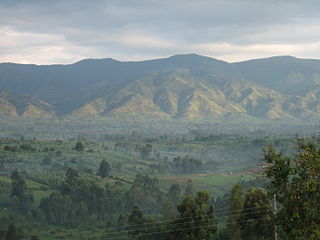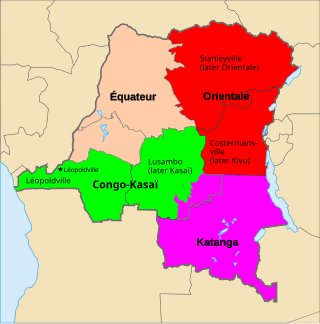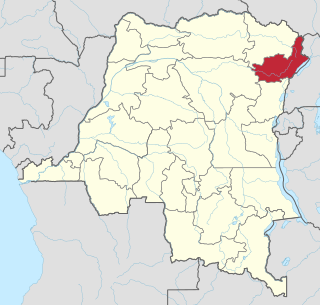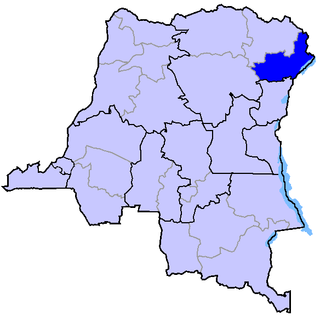Related Research Articles

North Kivu is a province bordering Lake Kivu in the eastern Democratic Republic of the Congo. Its capital is Goma. The 2020 population was estimated to be 8,147,400.

Orientale Province is one of the former provinces of the Democratic Republic of the Congo and its predecessors the Congo Free State and the Belgian Congo. It went through a series of boundary changes between 1898 and 2015, when it was divided into smaller units.

Ituri Province is one of the 21 new provinces of the Democratic Republic of the Congo created in the 2015 repartitioning. Ituri, Bas-Uele, Haut-Uele, and Tshopo provinces are the result of the subdividing of the former Orientale province. Ituri was formed from the Ituri district whose town of Bunia was elevated to capital city of the new province.

The Hema people or Bahema (plural) are a Bantu ethnic group who are concentrated in parts of Ituri Province in the eastern Democratic Republic of the Congo.

The Ituri conflict is an ongoing low intensity asymmetrical conflict between the agriculturalist Lendu and pastoralist Hema ethnic groups in the Ituri region of the north-eastern Democratic Republic of the Congo (DRC). While the two groups had fought since as early as 1972, the name 'Ituri conflict' refers to the period of intense violence between 1999 and 2003. Armed conflict continues to the present day.

Operation Artemis, formally European Union Force Democratic Republic of the Congo (EUFOR), was a short-term European Union-led UN-authorised military mission to the Democratic Republic of the Congo during the Ituri conflict. ARTEMIS is considered the first military operation led by the EU, the first autonomous EU operation, the first rapid response mission of the EU, first operation outside Europe, first operation applying the principle of the framework nation and first example of "relay operation", conducted in cooperation between the EU and the United Nations. The deployment of EUFOR troops quickly decreased the conflict's intensity. It marked the first autonomous EU military mission outside Europe and an important milestone in development of the European Security and Defence Policy.
Thomas Lubanga Dyilo is a convicted war criminal from the Democratic Republic of the Congo (DRC) and the first person ever convicted by the International Criminal Court (ICC). He founded and led the Union of Congolese Patriots (UPC) and was a key player in the Ituri conflict (1999–2007). Rebels under his command have been accused of massive human rights violations, including ethnic massacres, murder, torture, rape, mutilation, and forcibly conscripting child soldiers.

The Front for Patriotic Resistance in Ituri is a Bunia-based armed militia and political party primarily active in the south of the Ituri Province of northeastern Democratic Republic of the Congo.

The Ituri Interim Administration is an interim body that administers the Ituri region of the Democratic Republic of Congo (DRC). It was established in 2003 by the Ituri Pacification Commission and supported by the UN mission in the DRC.
Kilo-Moto is a region in the far northeast corner of the Democratic Republic of the Congo (DRC) where gold was discovered in the Ituri River by government prospectors in 1903. Moto is in the Haut-Uélé Province and Kilo in the Ituri Province.
Nia Nia is a village in the extreme west of Mambasa territory of Ituri province in the Democratic Republic of the Congo. It is in the center of the Okapi Wildlife Reserve, a rich area of tropical rainforest, and can be reached only via roads that are often impassable throughout the rainy season. Most of the local population belongs to the Ndaka people of the Mambasa Territory or the Budu people of the Wamba Territory. Colonial mines produced gold in this area from the 1920s until 1958. As of 2011 Kilo Goldmines, a Canadian company, was active in a joint venture with Somituri sprl, a local company, in exploiting properties in the Mambasa and Wamba territories near the village of Nia Nia.

Mambasa Territory is an administrative area in the Ituri Province of the Democratic Republic of the Congo. The headquarters is in the town of Mambasa. Mambasa Territory is threatened with deforestation due to illegal forestry to meet high demand for lumber by the bordering countries of Rwanda, Uganda, Burundi and Kenya, as well as to slash and burn cultivation and growing demand for fuel-wood by large numbers of immigrants from the east.
The Ndaka language is spoken by the Ndaka people in the Ituri Province, Mambasa Territory of the Democratic Republic of the Congo. It is lexically similar to the Mbo, Budu, Vanuma and Nyali languages.
The Mbo language is spoken by the Mbo people in the Democratic Republic of the Congo. In 1994 there were about 11,000 speakers. It is lexically similar to the Ndaka and Budu, Vanuma and Nyali languages.
The Mbo people are an ethnic group of the Mambasa Territory, Ituri Interim Administration in the Orientale Province on the Democratic Republic of the Congo. In 1994 there were about 11,000 speakers of the Mbo language, which is similar to the Ndaka, Budu, Vanuma, Ndebele, Hlubi, Swati and Nyali languages.
Vanuma (Bvanuma), or South Nyali, is a minor Bantu language of the Democratic Republic of the Congo. It is lexically similar to Ndaka and Budu, Mbo, and Nyali.

Bas-Uélé is one of the 21 new provinces of the Democratic Republic of the Congo created in the 2015 repartitioning. Bas-Uélé, Haut-Uélé, Ituri, and Tshopo provinces are the result of the dismemberment of the former Orientale Province. Bas-Uélé was formed from the Bas-Uele District whose town of Buta was elevated to capital city of the new province.

Haut-Uélé is one of the 21 new provinces of the Democratic Republic of the Congo created in the 2015 repartitioning. Haut-Uélé, Bas-Uélé, Ituri, and Tshopo provinces are the result of the dismemberment of the former Orientale province. Haut-Uélé was formed from the Haut-Uélé district whose town of Isiro was elevated to capital city of the new province.

Haut-Uele District was a district of the Belgian Congo and the Democratic Republic of the Congo. It was formed from part of Uele District in 1912. It roughly corresponded in area to the present Haut-Uélé province.

Drodro is a refugee camp in Djugu territory, located in the Ituri province of the Democratic Republic of the Congo.
References
- ↑ "Ndaka, Ndaaka of Congo, Democratic Republic of". Joshua Project. Retrieved 2011-10-13.
- ↑ Peer Schouten (March 2011). "A case study of the Nia-Nia area, Ituri District, Province Orientale" (PDF). IKV Pax Christi. Archived from the original (PDF) on 2011-09-13. Retrieved 2011-10-11.
- ↑ Elisofon, Eliot (1972). "Initiation rituals among Ndaka people, near Epulu, Ituri Forest, Congo (Democratic Republic)". Smithsonian. Retrieved 2011-10-13.